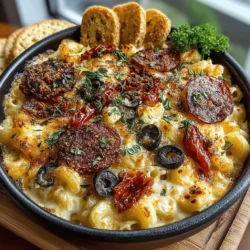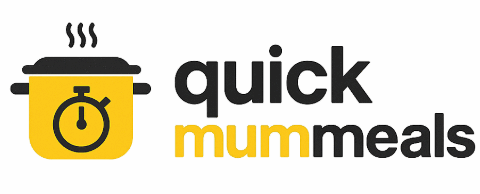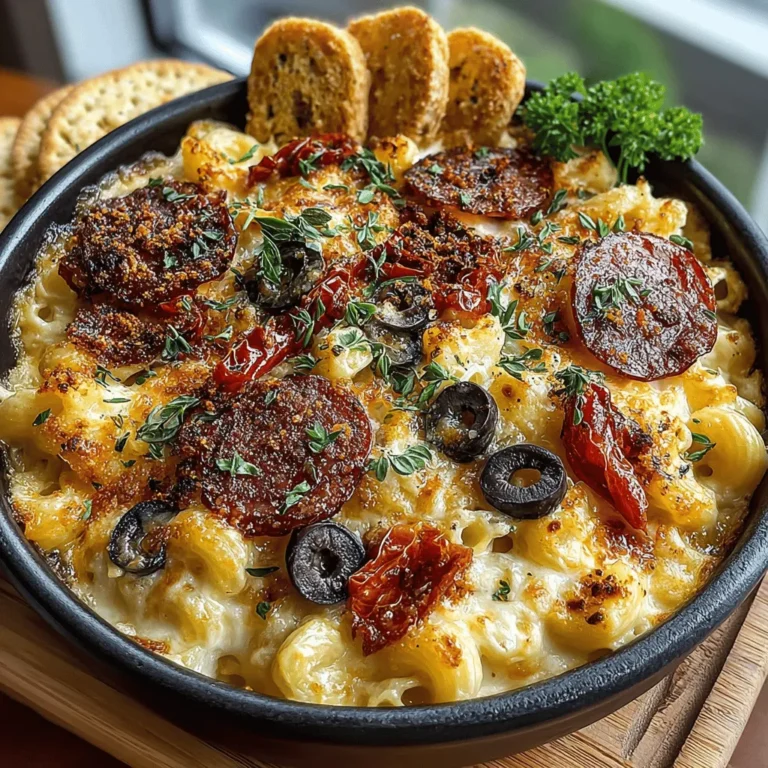In recent years, charcuterie boards have taken the culinary world by storm. These beautifully arranged platters filled with cured meats, cheeses, fruits, and other delectable items have become a staple at gatherings and parties, captivating food enthusiasts and home cooks alike. As the trend continues to grow, innovative recipes are emerging that blend the classic elements of charcuterie with beloved comfort foods. One such creation is the Charcuterie Board Mac and Cheese — a delightful dish that marries the creamy richness of mac and cheese with the sophisticated flavors of a charcuterie board.
The appeal of this dish lies in its ability to combine rich flavors and textures, creating an experience that elevates traditional mac and cheese to new heights. Imagine creamy pasta enveloped in a luscious cheese sauce, complemented by savory slices of salami, tangy goat cheese, and the briny burst of olives. This dish not only satisfies the craving for comfort food but also presents a visually stunning option for entertaining or simply enjoying a gourmet meal at home. In this article, we will guide you through the steps to create this unique recipe, highlighting its exceptional elements along the way.
Understanding Charcuterie Boards
Before diving into the specifics of our Charcuterie Board Mac and Cheese, it’s essential to understand what charcuterie truly represents. Originating from France, charcuterie refers to the art of preparing and assembling cured meats, including sausages, pâtés, and terrines. This culinary tradition dates back to ancient times when preserving meat was crucial for survival. Over the years, charcuterie has evolved into a celebrated craft, with artisans creating a wide array of flavorful products.
A traditional charcuterie board typically features an assortment of cured meats, artisan cheeses, and accompaniments such as pickles, nuts, and seasonal fruits. The beauty of a charcuterie board lies not only in its variety but also in its presentation, allowing guests to explore different flavor pairings at their leisure. The trend of incorporating charcuterie elements into various recipes has gained traction, resulting in innovative dishes that capture the essence of this dining experience.
Why Choose Mac and Cheese?
Mac and cheese holds a special place in the hearts of many as one of the ultimate comfort foods. Its creamy texture and cheesy flavor evoke feelings of nostalgia and warmth, making it a go-to dish for gatherings and cozy nights in. The versatility of mac and cheese is another factor contributing to its popularity; it can be customized to suit a wide range of tastes and preferences. From classic versions topped with breadcrumbs to gourmet variations featuring lobster or truffle oil, mac and cheese can adapt to any culinary trend.
By combining the elements of a charcuterie board with mac and cheese, we create a dish that not only satisfies traditional cravings but also introduces new and exciting flavors. The addition of charcuterie items provides depth and variety, transforming the familiar comfort of mac and cheese into an elevated dining experience. This recipe invites you to explore the delightful interplay of textures and tastes while enjoying a dish that feels both indulgent and sophisticated.
Ingredients Breakdown
To make the Charcuterie Board Mac and Cheese, we will need the following ingredients, each playing a crucial role in the overall flavor and texture of the dish:
– Elbow Macaroni: The quintessential pasta choice for mac and cheese, elbow macaroni is perfectly shaped to hold onto the creamy cheese sauce. Its small, tubular form allows for a delightful bite, ensuring each forkful is comforting and satisfying.
– Cheeses: A blend of sharp cheddar, goat cheese, and Parmesan creates a harmonious balance of flavors. Sharp cheddar provides that classic mac and cheese taste, goat cheese adds a tangy creaminess, and Parmesan contributes a nutty richness that enhances the overall dish.
– Whole Milk and Butter: These ingredients are essential for creating a rich, velvety cheese sauce. Whole milk adds creaminess, while butter enriches the sauce and enhances the flavor profile.
– Seasonings: A blend of garlic powder, onion powder, and mustard powder elevates the flavor of the cheese sauce, providing a subtle depth that complements the other ingredients without overwhelming them.
– Charcuterie Elements: This is where the dish truly shines. Slices of salami and prosciutto bring savory richness, while olives and roasted red peppers add brightness and acidity, creating a well-rounded flavor profile.
– Fresh Herbs and Crackers: For garnish and serving, fresh herbs such as parsley or chives add a pop of color and freshness. Including an assortment of crackers on the side allows guests to customize their experience, echoing the charcuterie board theme.
Step-by-Step Instructions
Now that we have gathered all the necessary ingredients, it’s time to embark on the journey of creating your Charcuterie Board Mac and Cheese. The process is straightforward, allowing both novice and experienced cooks to enjoy the experience of making this delightful dish.
1. Cook the Pasta: Begin by bringing a large pot of salted water to a boil. Add the elbow macaroni and cook according to the package instructions until al dente. Drain the pasta and set it aside, making sure not to rinse it, as the starch helps the cheese sauce adhere better.
2. Prepare the Cheese Sauce: In a large saucepan, melt the butter over medium heat. Once melted, whisk in the flour to create a roux, cooking it for about 1-2 minutes until it turns a light golden color. Gradually pour in the whole milk, whisking continuously to avoid any lumps. Continue to cook, stirring frequently until the mixture thickens and coats the back of a spoon.
3. Add the Cheeses: Remove the saucepan from the heat and stir in the shredded sharp cheddar, crumbled goat cheese, and grated Parmesan. Mix until the cheeses are fully melted and the sauce is creamy. If needed, season the sauce with garlic powder, onion powder, mustard powder, salt, and pepper to taste.
4. Combine Pasta and Sauce: Gently fold the cooked elbow macaroni into the cheese sauce, ensuring each piece of pasta is generously coated.
5. Incorporate Charcuterie Elements: Now comes the exciting part — fold in your choice of charcuterie elements, such as chopped salami, prosciutto, olives, and roasted red peppers. Mix until evenly distributed throughout the macaroni and cheese.
At this point, you have created the base of your Charcuterie Board Mac and Cheese. The next steps will involve transferring the mixture to a baking dish and finishing it off with a few final touches, which we will cover in the next section. The dish is not only a feast for the taste buds but also a visual delight, embodying the essence of a charcuterie board in a comforting, creamy format.
{{image_2}}
Cooking the Macaroni
To begin making your Charcuterie Board Mac and Cheese, start by cooking your macaroni. Choose a high-quality pasta, such as elbow macaroni or cavatappi, which holds the cheese sauce beautifully. Fill a large pot with water, ensuring you have enough to allow the pasta to move freely as it cooks. Bring the water to a rolling boil over high heat.
Importance of Salting the Water for Flavor
One crucial step that many home cooks overlook is salting the water before adding the pasta. This is your opportunity to infuse flavor directly into the macaroni. Use about one tablespoon of salt for every four quarts of water. The salting enhances the overall taste of the dish, ensuring that each bite of pasta is seasoned from the inside out.
Once the water is boiling, add the macaroni, stirring occasionally to prevent it from sticking. Cook according to the package instructions until the pasta is al dente, which usually takes about 7-10 minutes. You want it firm enough to hold its shape but tender enough to complement the creamy cheese sauce.
Preparing the Cheese Sauce
While the pasta cooks, it’s time to prepare the cheese sauce, which is the heart of this dish. The sauce is made by creating a roux, a fundamental technique in cooking that serves as a thickening agent for various sauces.
Explanation of Making a Roux and Its Significance
To create a roux, melt equal parts butter and flour in a saucepan over medium heat. For this recipe, you will need about 4 tablespoons of unsalted butter and 4 tablespoons of all-purpose flour. Stir constantly for about 2-3 minutes until the mixture turns a light golden color and develops a nutty aroma. This process not only thickens the sauce but also adds depth of flavor.
Tips for Avoiding Lumps When Adding Milk
After the roux is ready, gradually add in about 4 cups of milk (whole milk or 2% work best for creaminess) while whisking continuously. This is where many cooks encounter lumps. To avoid this, ensure that the milk is at room temperature before adding it to the roux. This helps it incorporate more smoothly. Continue whisking until the mixture is thickened and bubbles begin to form, about 5-7 minutes.
Once thickened, reduce the heat to low and stir in the seasonings—salt, pepper, and a pinch of garlic powder for an extra layer of flavor.
Incorporating the Cheeses
Now it’s time to elevate your sauce with cheese. Mix in a combination of your favorite cheeses for a rich, complex flavor. A blend of sharp cheddar, creamy Gruyère, and tangy goat cheese creates a delightful fusion. Aim for about 2 cups of shredded cheese total.
Techniques for Ensuring a Creamy, Well-Blended Sauce
To ensure a smooth and creamy sauce, add the cheese gradually, stirring continuously until each addition is melted and incorporated fully. This technique helps to prevent clumping and ensures that the cheese sauce remains velvety.
Combining Pasta and Sauce
Once your cheese sauce is ready, it’s time to combine it with the cooked macaroni. Drain the pasta in a colander and return it to the pot. Pour the cheese sauce over the pasta and stir until every piece of macaroni is generously coated.
Achieving the Right Consistency and Flavor Balance
If the mixture appears too thick, you can add a splash of milk to reach your desired consistency. Taste the mac and cheese at this stage and adjust the seasoning, if necessary. A hint of nutmeg or a dash of hot sauce can also enhance the flavors, giving your dish a unique twist.
Incorporating Charcuterie Elements
Now comes the fun part: incorporating your charcuterie elements into the mac and cheese. Think about flavors that complement the cheese sauce without overwhelming it.
How to Mix in the Charcuterie Components Without Overwhelming the Dish
Chop your selected charcuterie—prosciutto, salami, and perhaps some diced smoked sausage or chorizo—into bite-sized pieces. Gently fold these meats into the macaroni and cheese mixture, ensuring they are evenly distributed but not dominating the dish. The key is to enhance the flavor profile while maintaining the integrity of the mac and cheese.
Optional Baking for Crunch
For those who enjoy a bit of crunch, consider baking your Charcuterie Board Mac and Cheese. This step not only adds texture but also creates a delightful golden crust on top.
Benefits of Baking for Texture and Flavor Enhancement
To bake, preheat your oven to 350°F (175°C). Transfer the mac and cheese mixture to a greased baking dish. For an extra layer of flavor and crunch, top with breadcrumbs mixed with melted butter and a sprinkle of Parmesan cheese. This breadcrumb topping will become crispy and flavorful, enhancing the overall dish.
Details on How to Achieve the Perfect Bubbly, Golden Top
Bake in the preheated oven for about 20-25 minutes, or until the top is bubbly and golden brown. For an even crispier top, you can broil it for an additional 2-3 minutes, keeping a close eye to prevent burning.
Presentation and Serving
Once your Charcuterie Board Mac and Cheese is baked to perfection, presentation is key. Serve it hot from the oven for maximum impact.
Ideas for Garnishing and Arranging the Dish Attractively
For a gourmet touch, sprinkle freshly chopped herbs, such as parsley or chives, over the top just before serving. This adds a pop of color and freshness. You can also arrange additional charcuterie meats and cheese slices around the serving dish for a visually appealing spread.
Suggestions for Pairing with Crackers and Baguette Slices
Accompany your mac and cheese with an assortment of crackers and fresh baguette slices. These not only add a delightful crunch but also provide a nice contrast to the creamy pasta. Consider offering a selection of pickles or olives on the side to enhance the charcuterie experience.
Nutritional Information
Understanding the nutritional benefits of the ingredients you use can help you make informed choices.
Overview of the Nutritional Benefits of Key Ingredients
Pasta provides carbohydrates for energy, while cheese is a great source of calcium and protein. The addition of charcuterie brings in healthy fats and flavor, although it’s important to consume these in moderation due to their salt content.
Discussion on Portion Sizes and Serving Suggestions
This recipe serves approximately 6-8 people as a main dish. For a balanced meal, consider pairing it with a fresh salad or steamed vegetables to round out the meal. Keep portion sizes in mind, as mac and cheese is quite rich, and a little goes a long way.
Conclusion
In conclusion, the Charcuterie Board Mac and Cheese is a delightful fusion of classic comfort food and the sophisticated flavors of a charcuterie board. Its creamy texture, combined with the savory notes of cured meats and the richness of various cheeses, makes this dish a standout for any gathering or family meal.
We encourage you to try this recipe for your next cozy gathering or as a special treat for your loved ones. The joy of merging traditional mac and cheese with charcuterie flair creates a dish that not only delights the palate but also sparks conversation and connection around the table. Enjoy the process of making it, and most importantly, savor each delicious bite!


